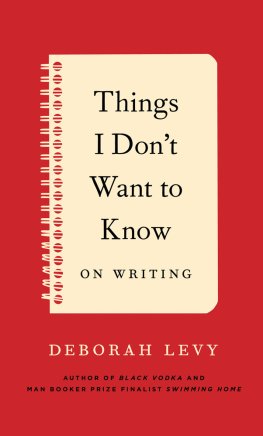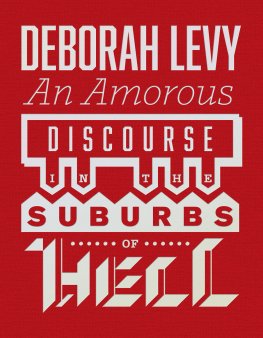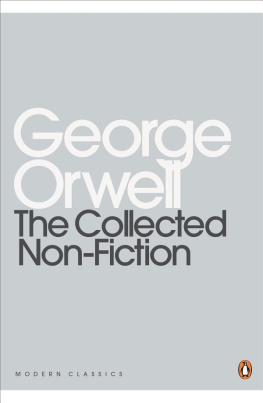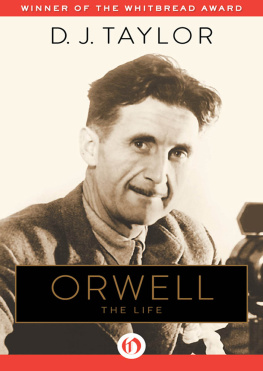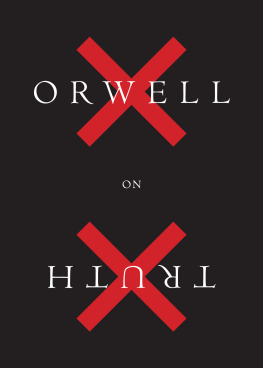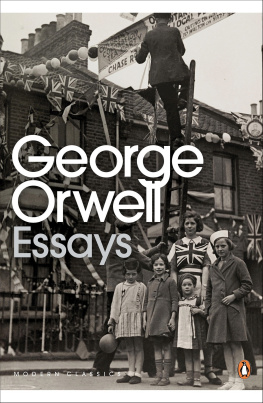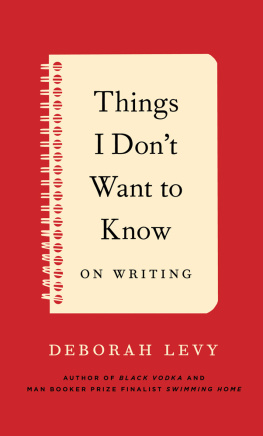Deborah Levy
Things I Don't Want to Know
All animals are equal but some animals are more equal than others.
George Orwell, Animal Farm (1945)
I know roughly speaking, how I became a writer. I dont know precisely why. In order to exist, did I really need to line up words and sentences? In order to exist, was it enough for me to be the author of a few books?. . One day I shall certainly have to start using words to uncover what is real, to uncover my reality.
Georges Perec, Species of Spaces and other Pieces (1974)
You are your life, and nothing else.
Jean-Paul Sartre, No Exit (1944)
That spring when life was very hard and I was at war with my lot and simply couldnt see where there was to get to, I seemed to cry most on escalators at train stations. Going down them was fine but there was something about standing still and being carried upwards that did it. From apparently nowhere tears poured out of me and by the time I got to the top and felt the wind rushing in, it took all my effort to stop myself from sobbing. It was as if the momentum of the escalator carrying me forwards and upwards was a physical expression of a conversation I was having with myself. Escalators, which in the early days of their invention were known as travelling staircases or magic stairways, had mysteriously become danger zones.
I made sure I had lots to read on train journeys. This was the first time in my life I had ever been pleased to read newspaper columns about the things that happened to the journalists lawnmower. When I wasnt absorbed in this kind of thing (which I experienced as being shot with a tranquilliser dart) the book I read most was Gabriel Garcia Marquezs short novel, Of Love and Other Demons. Out of all the loved and loveless characters dreaming and scheming in hammocks under the blue Caribbean sky, the only one that really interested me was Bernarda Cabrera, the dissolute wife of a Marquis who has given up on life and his marriage. To escape from her own life Bernarda Cabrera is introduced to magic chocolate from Oaxaca by her slave lover and starts to live in a state of delirium. Addicted to sacks of cacao and fermented honey, she spends most of the day lying naked on her bedroom floor, enveloped in the glow of her lethal gases. By the time I got off the train and started to weep on the escalator that apparently was inviting me to read my mind (at a time in my life I preferred to read other things) I began to regard Bernarda as a role model.
I knew things had to change when one week I found myself staring intently at a poster in my bathroom titled The Skeletal System. This featured a human skeleton with its inner organs and bones labelled in Latin and which I constantly misread as The Societal System. I made a decision. If escalators had become machines with torrid emotionality, a system that transported me to places I did not want to go, why not book a flight to somewhere I actually did want to go?
Three days later, I zipped up my brand new laptop and found myself sitting in aisle seat 22C heading for Palma, Majorca. As the plane took off I realised that being stranded between the earth and the sky was a bit like being on an escalator. The man unlucky enough to be sitting next to a weeping woman looked like he had once been in the army and now spent his life lying on a beach. I was pleased my cheap airline buddy was a tough guy with hard square shoulders and jagged welts of sunburn striping his thick neck but I did not want anyone to attempt to comfort me. If anything my tears seemed to send him into a tantric shopping coma because he called for the air hostess and ordered two cans of beer, a vodka and coke, an extra coke, a tube of Pringles, a scratchcard, a teddy bear stuffed with mini chocolate bars, a Swiss watch on special offer, and asked the crew if the airline had one of those questionnaires to fill in where you get a free holiday if its drawn out of the hat. The tanned military man pushed the teddy bear into my face and said, Thatll cheer you up if nothing will, as if the bear was a handkerchief with glass eyes sewn on it.
When the plane landed in Palma at 11p.m., the only taxi driver prepared to drive me up the steep mountain roads might have been blind because he had white clouds floating across both his eyes. No one in the queue wanted to admit they were anxious he would crash the car and avoided him when he pulled up at the taxi rank. After we negotiated the price, he managed to drive without looking at the road and instead had his fingers on the dial of the radio while staring at his feet. An hour later he began to manoeuvre his Mercedes up a narrow road lined with pine trees that I knew went on for a deceptively long time. He managed to get half way up and then suddenly shouted NO NO NO and abruptly stopped the car. For the first time all spring I wanted to laugh. We both sat in the dark, a rabbit running through the grass, neither of us knowing what to do next. In the end I gave him a generous tip for driving so dangerously and started the long walk up the dark path that I vaguely remembered led to the hotel.
The smell of wood fires in the stone houses below and the bells on sheep grazing in the mountains and the strange silence that happens in between the bells chiming suddenly made me want to smoke. I had long given up smoking but at the airport I had bought a packet of Spanish cigarettes, fully intending to start again. I sat down on a damp rock under a tree that was a little way off the path, pushed my laptop between my shins and lit up under the stars.
Smoking cheap Spanish filthy sock-tobacco under a pine tree was so much better than trying to hold it together on escalators. There was something comforting about being literally lost when I was lost in every other way and just as I was thinking I might have to sleep on the mountain that night, I heard someone shout my name. A number of things happened at once. I heard the sound of someone on the path and then I saw the feet of a woman in red leather shoes making her way towards me. She shouted my name again but for some reason I was unable to attach the name she was shouting to myself. Suddenly a torch was being shone in my face and when she saw me sitting on a rock under a tree smoking a cigarette, the woman said, Ah there you are.
The womans face was shockingly pale and I wondered if she was mad. But then I remembered I was the mad one because she was trying to get me off my rock on the edge of a mountain dressed for the beach on a night when the temperature had fallen to below freezing.
I saw you walking in to the forest. I think you are lost eh?
I nodded, but must have looked confused because she said, I am Maria.
Maria was the owner of the hotel and she looked much older and sadder than the last time we met. She probably thought the same about me.
Hello Maria.
I stood up. Thank you for coming to find me.
We walked in silence back to the hotel and she pointed with her torch to the turning where I had missed the path, as if she was a detective gathering evidence for something neither of us could fathom.
People who book into this pensin want particular things: a quiet place near the citrus orchards and waterfalls, cheap large rooms, a calm place to rest and think. There is no mini bar or TV, no hot water, no room service. Never advertised in tourist guides, word of mouth alone made sure it was always full in season. The first time I stayed here was in my early twenties when I was writing my first novel on a Smith Corona typewriter which I carried in a pillow case; then in my late thirties when I was in love and carrying what was then called a luggable computer. I had to buy a special bag for it, a long rectangle with extra padding and little compartments for the mouse and keyboard. I was very proud of it and even prouder of being able to set it up in any hotel room with the extension lead I had bought at the airport. The parched August afternoon I lugged my luggable (very heavy) computer up this mountain, plus all my other bags, I was wearing a short blue cotton dress and suede walking shoes and was as happy as it is possible to be. When happiness is happening it feels as if nothing else happened before it, it is a sensation that happens only in the present tense. I liked being on my own with the knowledge that I was returning to my sweetheart, the great love of my life. I phoned him every evening from the old fashioned call box next to the pizzeria, holding on tight to the fistful of sweaty 100 peseta coins that connected us to each others voice, rolling the coins in to the slot, believing that love, Great Love, was the only season I would ever live in.

